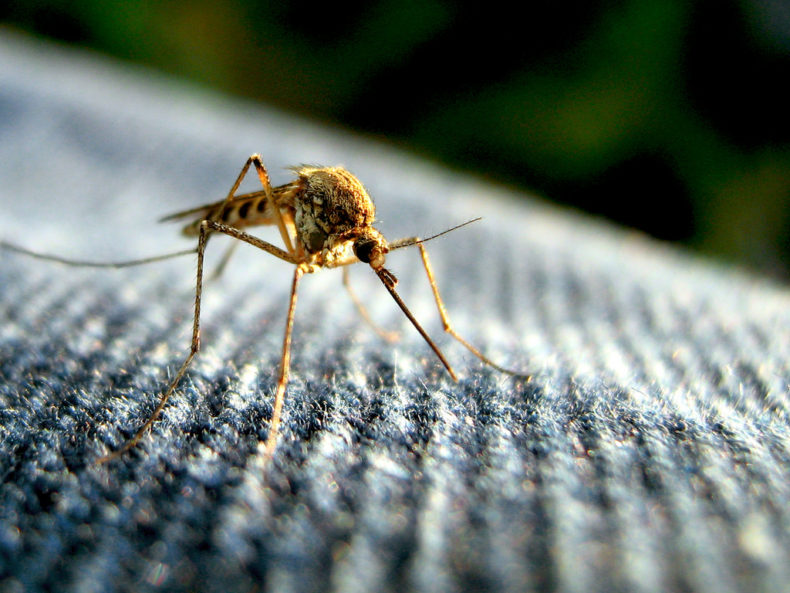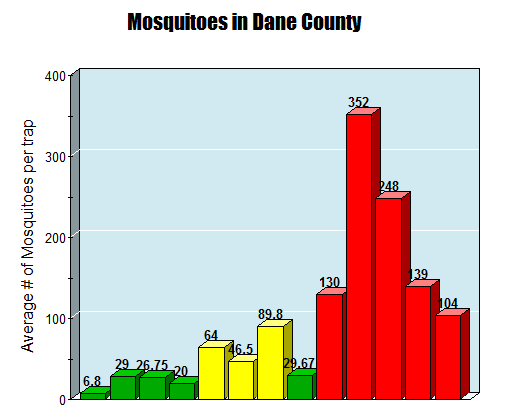 Two weeks ago, tomatoes began splitting on the vine. Days of hard rain had left them dangling plump and heavy, and their cellophane skin couldn’t hold together.
Two weeks ago, tomatoes began splitting on the vine. Days of hard rain had left them dangling plump and heavy, and their cellophane skin couldn’t hold together.
I wanted to harvest them. I tried on several occasions. But each foray into the backyard brought forth swarms of mosquitoes. By the time I reached the edge of the patio, they had already picked up my scent. As long as I was running, I was safe. But the moment I stopped to pluck tomatoes, they descended and slipped their hypodermic mouths into my flesh. Fact: Hands can either hold ripe tomatoes or swat mosquitoes. They can’t do both.
The dog was in her own special hell. She stood in the yard enveloped in a swirling, droning cloud of insects. Occasionally, she would whiplash her body around to confront her invisible attacker. But there was no one. All she could do was stare at her butt with haunted eyes. Eventually, it all became too much. She ran to the middle of the yard and began digging. Before we could stop her, she’d carved out a watermelon-sized hole. And who could blame her for trying to go underground?
What confounded me was the abruptness with which they appeared. June was delightful. July was perfectly pleasant. And then came August, and everything changed.
Researchers at the University of Wisconsin monitor mosquitoes in and around Madison, where I live. One night each week they set out carbon dioxide traps in six different locations. And their 2016 numbers match my perception. Mosquitoes weren’t a problem, and then one day they were. I’ve put together a sad bar graph that clearly illustrates this. Each bar represents one summer week. Back in June (green), there were just a handful of mosquitoes in the traps. And then we hit August (red), a perfect cocktail of wet and hot, and the population skyrocketed.
Mosquitoes are the worst. They spread malaria and Zika and dengue. They suck our blood. They drive people batshit crazy. So why not wipe them out?
The idea has been floated time and time again. Science writer David Quammen made a strong case for keeping mosquitoes back in 1981. In a piece for Outside Magazine, Quammen argued that mosquitoes play a crucial role in saving the rainforest. The diseases they carry keep people away, making the insects “one of the great ecological heroes of planet earth,” he wrote,
But the best argument for not blowing these bloodsuckers off the face of the globe is this: We seem incapable of a surgical strike. Earlier this month, officials in Dorchester County, South Carolina greenlighted a plan to knock down mosquito populations by spraying a fine mist of insecticide from an airplane. The result? Millions upon millions of dead bees.
Humans seem particularly inept at predicting the long-term ecological consequences of our actions. Most of the time, this doesn’t matter all that much. The stakes are low. But driving a species extinct on purpose? I would argue that’s a high-stakes proposition.
This year, the idea of eliminating mosquitoes gained new life. Scientists have powerful new gene-editing technology that would allow them to insert a gene into an organism and ensure that it spreads through the population. (Read more about how it works here.) And they’ve already tested it in mosquitoes. We are perhaps a year away from having a precision weapon that could drive mosquitoes — or any other insect — extinct.
If that makes you nervous, you’re not alone. A mosquito-free world would be a boon for humans, but what about the planet’s other inhabitants? Everything is connected. Remove a single species and you risk setting off a cascade of unintended consequences. Humans have driven species extinct before of course, but never with the sole goal of intentional eradication. It’s a moral boundary that should give us pause.
****
Image courtesy of Tom via Flickr

We’ve intentionally eradicated the parasitic blowfly Cochliomyia hominivorax (commonly known as the screwworm fly) from a large part of its original range, and efforts to eradicate it altogether are ongoing; it probably won’t be missed if and when it becomes extinct. The three species of lice that are obligate parasites of Homo sapiens have also become rare in the industrialized world, and may eventually be driven to extinction with no appreciable impact on the ecosystem and nobody mourning their disappearance.
Mosquitoes are a more complicated issue, as their larvae may play a significant role in aquatic food chains, but eradicating certain species of mosquito that are particularly dangerous disease vectors (especially Anopheles gambiae, the most effective vector of malaria, and Aedes aegypti, the primary vector of yellow fever, which also carries dengue and Zika) would probably provide benefits to health far outweighing any environmental costs. Aedes‘ role in food chains is minimal, as it’s a “container breeder” — it breeds in tiny, ephemeral pools of water such as those that collect in tree holes, animal burrows, and, in the modern world, discarded tires, cans, bottles, etc. after rain, not in permanent ponds or streams where it could provide a food source for fish or other aquatic life.